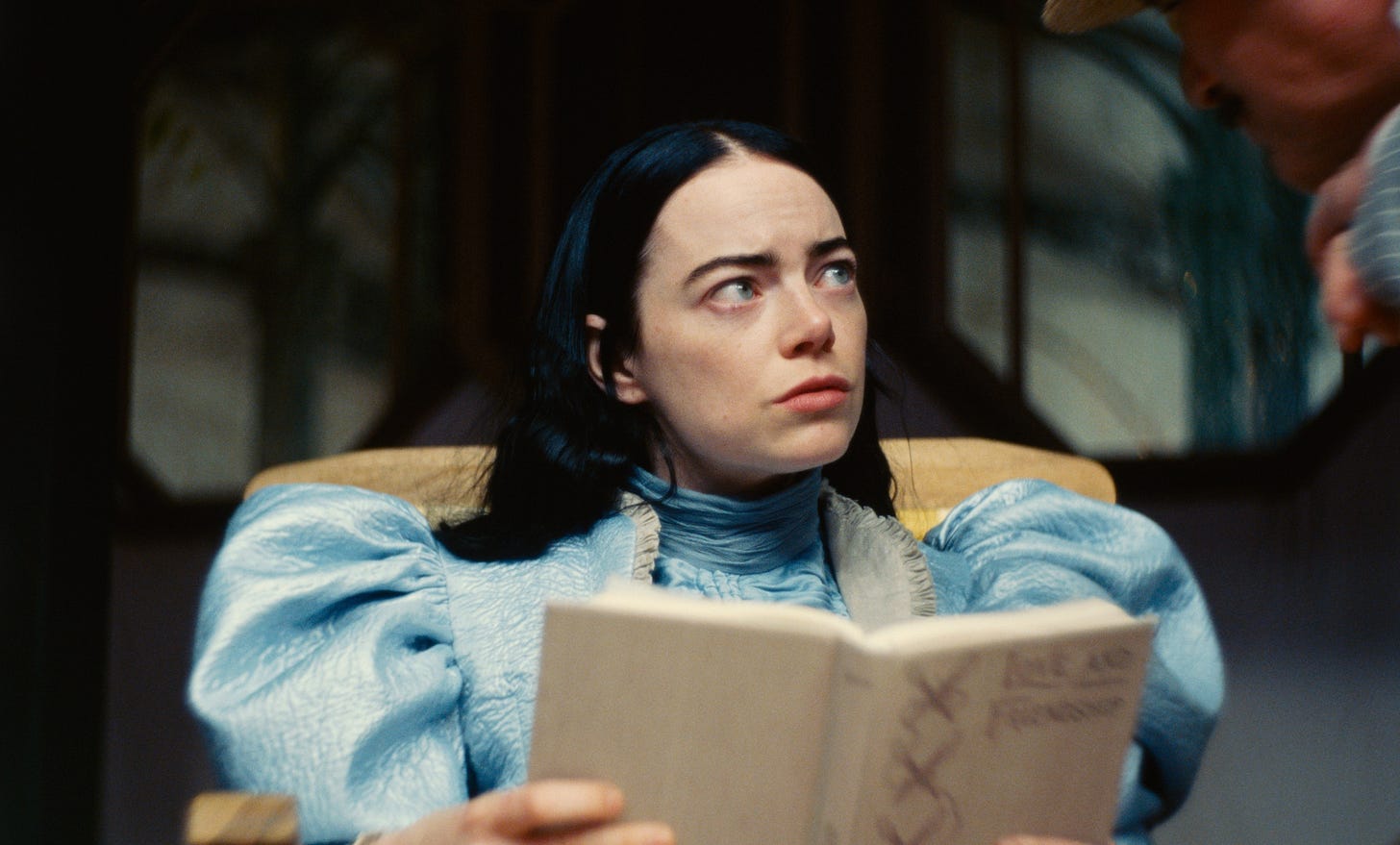The Moral Dilemmas of an Amateur Film Critic
On watching Poor Things, and other potentially problematic film & television
In today’s newsletter, I invited my friend Tory Crowley to write about her experience watching Poor Things, the latest critically acclaimed, award-winning film by Yorgos Lanthimos that is up for more awards on the night of the Oscars.
At the same time that critics and audiences are raving, many of us have read the ratings and wondered if we can or should sit through some its content. Tory felt that dilemma in the theater, after purchasing a ticket and watching half the movie.
A few weeks back, I asked if she had seen Poor Things and if she thought I should, too. Tory shared with me about what was going on in her head when she watched it, and I said, hey that’s great. Would you want to write about that for Leading Ladies?
Because one of my favorite conversations around film and television is about how to discern that gray area of what is or isn’t acceptable. For some people, it’s black and white. But read Tory’s piece below, which is really about how to watch great film and figure out where you draw the line for yourself.
-Heather Wright
There I was, sitting in the theater, feet up in the recliner — not relaxed at all. My favorite actress Emma Stone was onscreen playing Bella Baxter (her favorite character she’s ever played) in Poor Things.
It was at the part of the movie where Bella, on her journey to full personhood and full womanhood, was working as a prostitute. She was delivering services to what felt like her dozenth client in the oddly cushy Paris brothel she called home.
I had seen her naked a lot in the past hour, as well as the several men who were with her. Each encounter had something about it designed to get under your skin a bit more, and it worked. “This is too much,” I thought to myself.
I knew this movie would be weird (in the best way). I mean, look at Emma’s eyebrows! Look at director Yorgos Lanthimos’ resume! And I knew there would be a lot of sex, but I wasn’t anticipating the moral dilemma I encountered.
I couldn’t tell you the last time I walked out of a movie theater, but I almost did right then. And wow, I felt so lame about it. But I was also confused. I see a lot of movies. A lot of them have explicit content. I couldn’t put my finger on where my apprehension was coming from with Poor Things.
Was I just a prude deep down, bristling at this movie because it pushed past my (frankly, pretty generous) limit for sexual content? Maybe, but I think there’s more to it than that.
Poor Things contradicted my worldview in a way that was uncomfortable to me. That’s why I wanted to leave. And from my girl, Emma?!
I have loved Emma Stone since I first saw her in Superbad. I have loved seeing the different paths she’s chased down in her career, complex characters, wildly different from each other. I love it when she wins awards. I love it when she makes me laugh by being charming and goofy during Q&As. I want to see her. I want to root for her.
And you know what, I want to trust her. My discomfort while watching her in Poor Things was less about what I was seeing and more about the story I was interpreting.
Here was someone I love — Emma Stone — telling me a lie about something that’s deeply personal and deeply vulnerable: the value of sex and the sacredness of our bodies. In this movie, she was telling me they’re meaningless. And I know they’re not.
It might sound silly, but to watch this movie with my integrity intact, I had to engage in a mental, emotional, and spiritual battle. I had to tell myself that the message it was giving me wasn’t true. I had to remind myself that sex and our bodies are sacred. It’s hard to do. It’s so much easier to sit back and consume the story I’m given without question.
When I look back on movies or shows I regret watching, that felt “wrong” to watch, it was because I didn’t fight that battle. I wasn’t strong enough or prepared enough to do it. I believed the messages they told me. And when that happens, it takes time to regain the ground I’ve surrendered. (It’s been 15 years since I first watched Sex and the City, and I still find myself at times having to unlearn messages I took in from that show.)
This recently happened to me with the tv show Normal People. I talked to a lot of friends about this show, assuming that there would be a universal consensus that it was too graphic, too sexual, just too much. No one I talked to felt that way, but I did.
I reflected on my experience of watching that show and realized I just wasn’t ready to do battle. The show gave me the message that emotional and sexual intimacy is the highest form of human connection, and I just ate it up. Maybe if I had seen the show a year earlier or later, I would have responded differently.
But when I watched Normal People, I was vulnerable, and it got me. I was working through my own thoughts on intimacy and connection, and I didn’t have the tools I needed to break down the message the show gave me. If I had, I would have been in a place to better appreciate the incredible aspects of the show — the story, the character development, and the artful camera shots — without buying into Normal People’s definition of true intimacy.
That’s what I was thinking about as I sat in that recliner seat back in December, one finger on the footrest button, watching Emma Stone as Bella Baxter, enjoying her life as a carefree prostitute. Was I strong enough to wrestle with this message right now? Or would I surrender to it? If the latter, I needed to leave.
I sat there in quiet reflection for a moment. I literally said a little prayer. And I decided I could stay. I finished the movie. (For the record, I don’t always choose to stay. I’ve experienced much FOMO from foregoing Game of Thrones, Fifty Shades, and Bridgerton, pieces that I know have cultural relevance but also contain messages that I don’t want to contend with.)
And you know what, Poor Things makes some terrible conclusions about what it means to be a woman and a human, and the value of our bodies.
However, I respect that the movie supported and stood by its conclusions. It told a compelling story and made a clear argument about human nature with a coherent worldview, all of it steeped in philosophical tradition tracing back to the existentialist and feminist themes of Mary Shelley’s Frankenstein. For those reasons, I think it’s a fantastic movie. And wrestling with the ideas it put forth has given me a deeper resolve for what I know to be true.
I hope that my whole life, I continue to grow in my ability to grapple with difficult ideas, moral quandaries, and questionable worldviews presented in good books and movies. But I also hope to grow in my ability to know when I’m weak, where I’m vulnerable, and to have the humility to sit it out if I need to.
Tory is a native Michigander (with stints as a New Yorker and Floridian). By day, she works as an editor at Policygenius Magazine, by night she teaches Humanities at Jackson College. Likes include sad movies, memoirs, long walks, big cities, and ice cream.








Tory,
I really appreciated this reflection. I, too, thought Poor Things was an extremely well-crafted yet philosophically abysmal film (if coherent, as you also note). I likewise felt conflicted while watching it, and since I typically go into films blind, I wasn't quite prepared for that experience. Subsequent reflection, both in writing and with other people, has helped me process my anger, frankly, over the views it evinced of the most precious and fundamental realities of being a woman, and being human. I'm grateful for the women Letterboxd users, with whom I probably disagree about a host of other issues, who have called out its dehumanizing worldview.